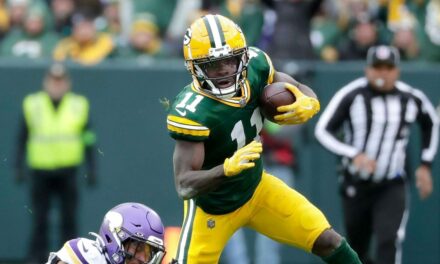The Green Bay Packers offense faced some real obstacles before they even took the field in their Week 1 loss in Minnesota. But the team failed to adequately deal with these challenges and instead suffered an inconsistent game filled with poor play calling and mental errors made throughout the game.
The team’s obstacles were obvious. The Packers knew they wouldn’t have Davante Adams, one of the best receivers in football in their lineup as he was traded to the Raiders. Before the game started, the Packers knew they would be without their top returning receiver in Allen Lazard who hadn’t practiced all week. They also knew they would be playing without their top two offensive linemen in David Bakhtiari and Elgton Jenkins who both spent training camp on the PUP list recovering from major knee injuries that required surgery.
The Packers also knew they would be facing a defense that was similar to theirs in that they played a lot of zone coverages that were designed to prevent the big play and make teams slowly move the ball down the field. The Vikings have an unproven set of cornerbacks and two formidable pass rushers in Za’Darius Smith and Danielle Hunter.
That meant that the Packers would have to create an offensive game plan that emphasized their remaining strengths and covered up for their weaknesses while taking advantage of the Vikings shortcomings. Unfortunately, the game plan they implemented failed to do accomplish much and the Packers scored only seven points in a disappointing opening day loss.
The strengths seemed obvious. The Packers still have the league’s two-time reigning MVP in quarterback Aaron Rodgers. AR-12 reads defenses as well as any quarterback in the NFL and is good at not turning the ball over.
The Packers also have two very good running backs who can both run the football and catch the ball out of the backfield to make big plays.
They also had veteran receivers in Sammy Watkins and Randall Cobb and experienced tight ends in Robert Tonyan and Marcedes Lewis.
With the pass blocking compromised and few familiar wide receivers available, it would make sense to run the ball more than usual and to utilize your most dangerous and reliable offensive weapons in Jones and Dillon in the passing game as well.
Unfortunately, the Packers failed to emphasize the running game throughout the game against a Minnesota defense that was geared more towards stopping the pass and ranked 26th in the league against the run a year ago.
Jones had only five rushing attempts all game. Dillon had only 10 carries. In those 15 rushes, the Packers top two backs gained 94 combined yards, an average of 6.3-yards per carry. The Packers failed to emphasize their running game more and paid the price for it.
Yes, the Packers fell behind in the game which tends to make teams throw the ball more but with five minutes left in the half, it was still a 7-0 game and it was 10-0 until Minnesota scored again in the final minute of the second quarter. In the first half, the Packers two backs had run the ball a combined total of eight times for 26 yards.
The running backs did have 11 of the 35 targets in the passing game, with six of those targets coming in the first half. Dillon and Jones had three each. But those plays weren’t a staple of the offense and they needed to be.
The Packers also failed to do what the Vikings did so effectively in this game which was scheme their players open. How often was Justin Jefferson running across the Packers zone so that he had to be covered by rookie inside linebacker Quay Walker or by safeties Adrian Amos and Darnell Savage. Minnesota created mismatches for their star receiver. The Packers, who needed to create mismatches in part because they lacked a star receiver, failed to do so with any regularity.
With the offensive line compromised and especially vulnerable on the right side where Jake Hanson was making his first NFL start and Royce Newman was playing a new position, the Packers should have gone to a quicker release passing game. Unfortunately, we saw too many plays where Rodgers held on to the ball for too long and the results were sacks and pressures. The plays simply didn’t have enough time to develop.
Then there were mental errors by the young receivers and by offensive linemen who missed assignments or didn’t run the proper routes. Rodgers also admitted to making mental mistakes and poor decisions throughout the game.
The Packers must come out and fix these problems before they face the Bears at the home opener at Lambeau Field on Sunday night. The good news is that historically, Matt LaFleur’s teams have responded after a poor performance. LaFleur’s teams have never lost two consecutive regular season games since he became head coach in 2019. Now, they need to play better and keep that streak alive on Sunday.
Follow Gil Martin on Twitter @GilPackers
Click here for more great Packers coverage


